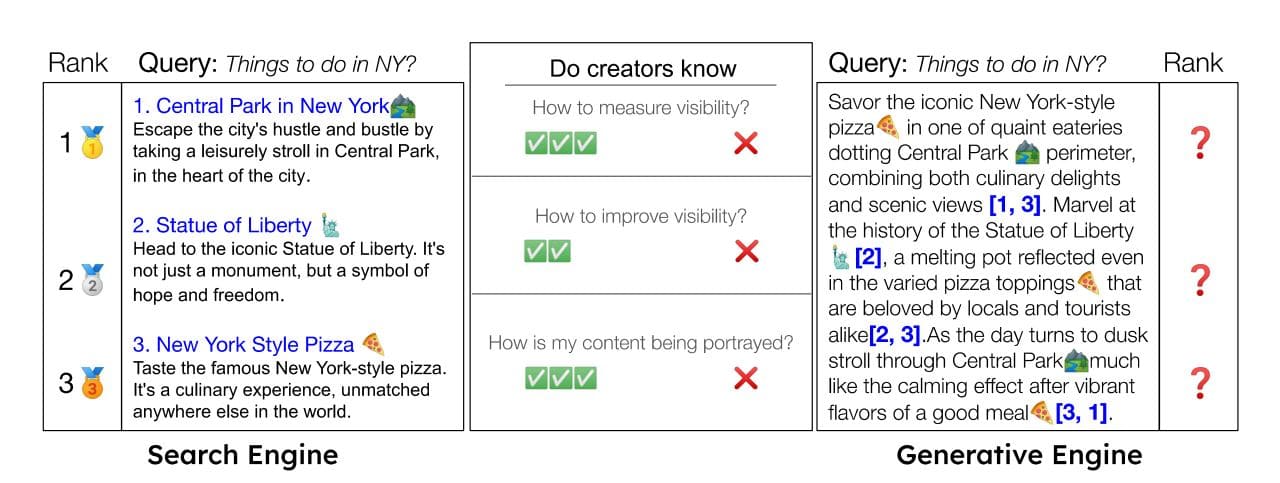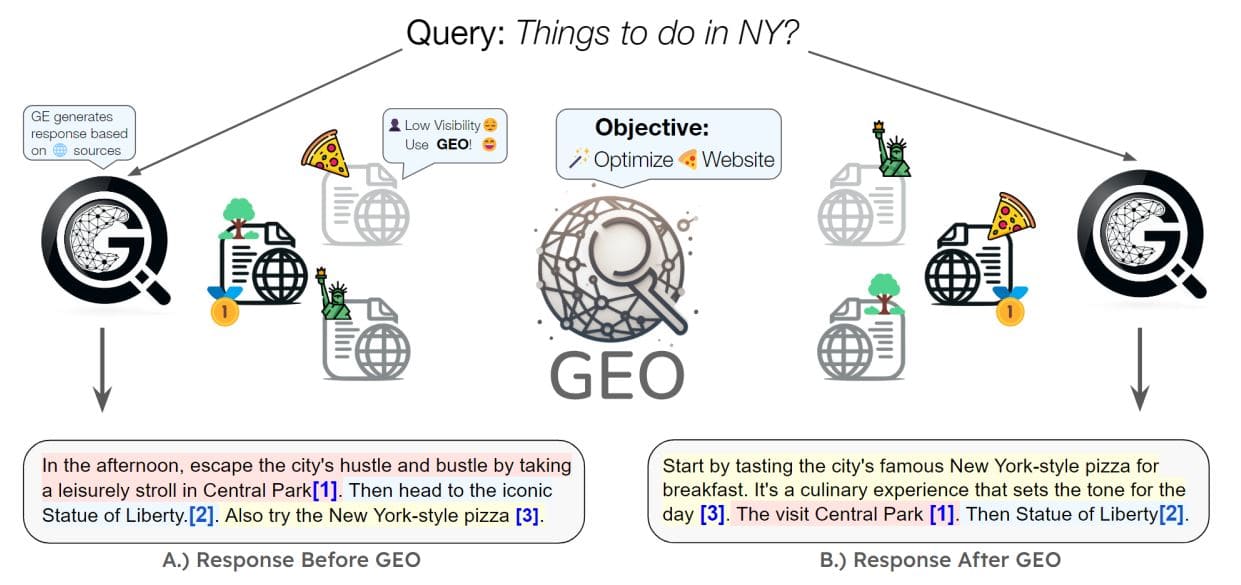GEO: Generative Experience Optimisation
A. Definition of Generative Experience Optimization (GEO)
Generative Experience Optimization (GEO) is an innovative approach that harnesses generative algorithms and artificial intelligence (AI) to elevate the quality and relevance of content within the framework of Search Generative Experience (SGE). Going beyond conventional content optimization, GEO dynamically generates personalized and engaging experiences for users, drawing insights from their preferences, behaviors, and real-time data.
B. Importance of GEO in content creation
In the rapidly evolving digital landscape, the demand for compelling and personalized content has become increasingly critical. GEO serves as a pivotal tool in meeting this demand, empowering content creators and businesses to streamline their efforts. By ensuring that content resonates with target audiences and enhances the overall user experience, GEO plays a crucial role in navigating the challenges of contemporary content creation.
I. Fundamentals of GEO
A. Understanding generative algorithms
GEO relies on generative algorithms, which are AI-based systems capable of autonomously creating content by learning from patterns in data. These algorithms can analyze vast datasets to understand user preferences and generate content that is contextually relevant and engaging.
B. Integration of AI in content optimization
The integration of AI in content optimization involves leveraging machine learning algorithms to continuously refine and adapt content strategies. AI algorithms within GEO ensure that content remains up-to-date, resonates with evolving user preferences, and maximizes its impact on target audiences.

II. Key Components of GEO
A. Data-driven content generation
GEO’s foundation lies in data-driven content generation, where algorithms analyze user behavior, preferences, and historical data to create content that aligns with individual user needs and preferences.
B. Dynamic keyword optimization
GEO incorporates dynamic keyword optimization, ensuring that content is not only relevant to user queries but also adapts to changes in search trends and algorithms, thereby maintaining a competitive edge in search engine rankings.
C. Personalization and user engagement
Personalization is a core component of GEO, tailoring content to the unique preferences and behaviors of individual users. This not only enhances user engagement but also fosters a deeper connection between the audience and the content.

III. Implementing GEO Strategies
A. Choosing the right generative models
Selecting appropriate generative models is crucial for successful GEO implementation. Content creators must evaluate and choose models that align with their specific objectives and user demographics.
B. Customizing content for target audience
Tailoring content to specific target audiences ensures that GEO strategies effectively resonate with users, providing them with personalized and relevant experiences.
C. Leveraging GEO for SEO improvement
GEO contributes significantly to Search Engine Optimization (SEO) by continuously adapting content to align with search engine algorithms and user search behaviors, ultimately improving organic search rankings.
IV. Challenges and Considerations
A. Ethical concerns in automated content creation
As with any AI-driven technology, GEO raises ethical concerns regarding the authenticity and transparency of content. Striking a balance between automation and maintaining ethical content creation practices is crucial.
B. Balancing human input with generative algorithms
While GEO relies on generative algorithms, human input remains essential to ensure content aligns with brand values, ethical considerations, and meets specific business objectives.
C. Addressing potential biases in GEO
GEO algorithms may inadvertently perpetuate biases present in training data. Implementing measures to identify and rectify biases ensures fair and unbiased content creation.
V. Case Studies
A. Successful examples of GEO implementation
Several businesses have successfully implemented GEO strategies, showcasing improved user engagement, enhanced personalization, and increased organic traffic.
B. Lessons learned from GEO campaigns
Analyzing lessons learned from GEO campaigns helps refine strategies, providing insights into optimizing content creation and improving overall user satisfaction.
GEO: Generative Engine Optimization from the Cornell University
VI. Future Trends in GEO
A. Evolving technologies in generative content
As technology advances, the future of GEO will witness the integration of more sophisticated generative content technologies, further enhancing the precision and personalization of content creation.
B. Potential advancements and innovations
Anticipated advancements in AI and generative algorithms will lead to innovative approaches in content creation, pushing the boundaries of what GEO can achieve.
Conclusion
A. Recap of GEO’s impact on content optimization
GEO revolutionizes content optimization by combining generative algorithms and AI, resulting in dynamic, personalized, and engaging content that resonates with users and improves overall user experience.
B. Call to action for businesses to embrace GEO strategies
In conclusion, businesses are urged to embrace GEO strategies to stay ahead in the digital landscape. By leveraging generative algorithms and AI, businesses can enhance their content creation processes, providing users with tailored and relevant experiences that drive success in the online environment.
FAQ – Frequently Asked Questions about GEO – Generative Experience Optimisation
What is Generative Experience Optimization (GEO), and how does it differ from traditional content optimization?
GEO is an innovative approach that utilizes generative algorithms and artificial intelligence to dynamically generate personalized and engaging content. Unlike traditional methods, GEO goes beyond static optimization, adapting to user preferences and real-time data for a more individualized user experience.
How do generative algorithms contribute to the fundamentals of GEO, and what role does AI play in content optimization?
Generative algorithms form the core of GEO, enabling autonomous content creation by learning from data patterns. AI, integrated into content optimization, ensures continuous refinement and adaptation of strategies, keeping content up-to-date and aligned with evolving user preferences.
What are the key components of GEO, and how do they enhance content creation?
The key components of GEO include data-driven content generation, dynamic keyword optimization, and personalization. These components work together to analyze user behavior, adapt to search trends, and tailor content to individual preferences, resulting in more relevant and engaging content.
What considerations should businesses keep in mind when implementing GEO strategies, and how does GEO contribute to SEO improvement?
Businesses must consider ethical concerns, balance human input with algorithms, and address potential biases in GEO. Additionally, GEO contributes to SEO improvement by continuously adapting content to align with search engine algorithms and user search behaviors, ultimately enhancing organic search rankings.
Can you provide examples of successful GEO implementations, and what lessons can be learned from these campaigns?
Several businesses have successfully implemented GEO, leading to improved user engagement and increased organic traffic. Lessons learned from these campaigns highlight the importance of refining strategies to optimize content creation and enhance overall user satisfaction.
What are the anticipated future trends in GEO, and how might technology advancements shape the landscape of generative content?
The future of GEO will witness the integration of more sophisticated generative content technologies. As technology advances, potential innovations in AI and generative algorithms will push the boundaries of what GEO can achieve, leading to more precise and personalized content creation.






